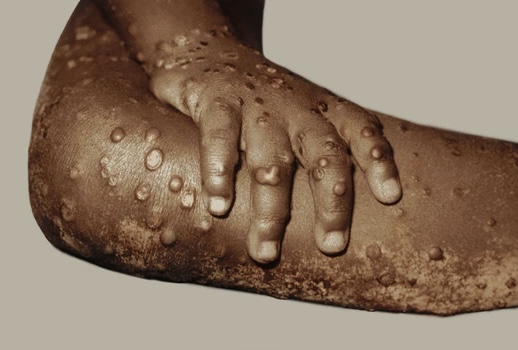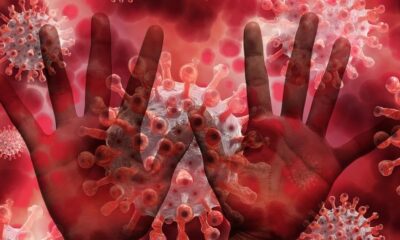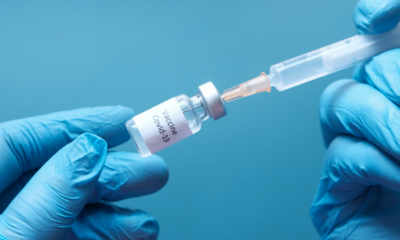News
CDC Monitoring Potential Outbreak Of Another Virus;

As public health officials keep track of the contagious Delta variant of COVID-19 across the U.S., the CDC is also watching for a potential outbreak of another virus — monkeypox.
More than 200 people in 27 states are being monitored for possible exposure after they had contact with an American who contracted monkeypox in Nigeria before traveling to Texas earlier this month, according to STAT News.
So far, none of the people who are being followed are considered high-risk, and none have contracted the virus.
The traveler flew on an overnight flight from Lagos, Nigeria, to Atlanta, Ga., on July 8 and then flew on another flight to Dallas on July 9. On July 15, the patient went to the emergency room at a Dallas hospital and was diagnosed with monkeypox, STAT reported.
State health officials and the CDC are monitoring people who sat within 6 feet of the traveler on the overnight flight, flight attendants, passengers who used a particular bathroom on the plane, those who cleaned the bathroom after the flight, and some family members who interacted with the person in Dallas.
“It’s believed the risk for spread of monkeypox on the plane and in the airports is low, as travelers were required to wear masks due to the COVID-19 pandemic, and monkeypox is primarily spread through respiratory droplets,” according to the CDC.
Monkeypox stems from a virus that is like smallpox. It was first discovered in 1958 when outbreaks occurred in colonies of monkeys being held for research in Africa, according to the CDC. The disease is typically mild and causes less severe illness than smallpox but can be fatal in about 10% of cases.
“However, [fatality] rates can be higher in people who have weakened immune systems,” the CDC wrote.
Symptoms include fever, headache, muscle aches, backache, swollen lymph nodes, chills, exhaustion and a particular pox-like skin rash that develops across the body, including the palms of hands and the soles of feet.
First detected in humans in the Democratic Republic of Congo in 1970, monkeypox typically occurs in remote parts of central and west Africa. It was last detected in the U.S. in 2003, according to the CDC, when 47 confirmed and probable cases were reported in six states: Illinois, Indiana, Kansas, Missouri, Ohio and Wisconsin.
Monkeypox is rarely detected in people, STAT reported. During the 2003 outbreak, which was the first time that human cases were reported outside of Africa, a shipment of animals from Ghana contained rodents and small mammals that had the virus. Those who contracted monkeypox became ill after having contact with infected prairie dogs purchased as pets, the CDC reported.
In recent years, Nigeria has seen an uptick in monkeypox cases, STAT reported. Seven exported cases have been identified, including four in the U.K., one in Singapore, one in Israel and one in the U.S.
The virus spreads through respiratory droplets, body fluids and bed linens or other items that have been used by an infected person, STAT reported. The time from exposure to symptoms can range from 3 to 17 days.
The CDC has asked local and state health authorities to monitor the 200 people who may have been exposed earlier this month for 21 days, which will end on July 30.
“Additionally, CDC has set up a call center for health departments for questions about monitoring contacts and for clinicians if monkeypox is suspected in a patient,” the CDC wrote. “The public should contact their local health department for questions.”
WebMD Health News.
Kenya Insights allows guest blogging, if you want to be published on Kenya’s most authoritative and accurate blog, have an expose, news TIPS, story angles, human interest stories, drop us an email on [email protected] or via Telegram
-

 Grapevine2 weeks ago
Grapevine2 weeks agoA UN Director Based in Nairobi Was Deep in an Intimate Friendship With Epstein — He Even Sent Her a Sex Toy
-

 Development3 days ago
Development3 days agoKenya Strips Dutch Climate Body of Diplomatic Immunity Amid Donor Fraud Scandal and Allegations of Executive Capture
-

 Investigations1 week ago
Investigations1 week agoHow Mexico Drug Lord’s Girlfriend Gave Him Away
-

 Business2 weeks ago
Business2 weeks agoSafaricom Faces Avalanche of Lawsuits Over Data Privacy as Acquitted Student Demands Sh200mn Compensation in 48 Hours
-

 Investigations1 week ago
Investigations1 week agoHow Close Ruto Allies Make Billions From Affordable Housing Deals
-

 Entertainment2 weeks ago
Entertainment2 weeks agoKRA Comes for Kenyan Prince After He Casually Counted Millions on Camera
-

 Politics2 weeks ago
Politics2 weeks agoI Personally Paid For Your Ticket To Visit Raila in India, Oketch Salah Silences Ruth Odinga After Claiming She Barely Knew Him
-

 Business1 week ago
Business1 week agoAmerican Investor Claims He Was Scammed Sh225 Million in 88 Nairobi Real Estate Deal































